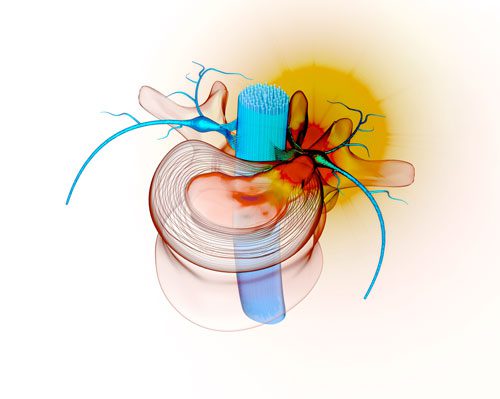Pinched Nerve
Spinal Nerve Compression
If you’ve had back or neck pain that didn’t go away on its own, your doctor has probably told you about pinched nerves. In fact, most people tend to dismiss most of their back pain as a “pinched nerve.” And while the condition is common, it should not be so easily dismissed. This condition is often the result of degenerative spine conditions that causes pain and other symptoms, and can get worse if left untreated. The causes for spinal nerve compression are many, and it’s important to find a doctor who is fluent in the symptoms, causes, and diagnostic procedures to identify the origin of the problem.
A pinched nerve is simply a nerve under pressure, whether from swelling around it or a mechanical issue in the spine. A nerve under enough pressure will lose its ability to carry accurate signals, and its wayward signals can cause a variety of sensations in the body. For example, when a nerve is pinched or compressed, it can trigger the nerve to falsely signal pain. The compression also can limit the nerve’s ability to control the muscles it serves.
If left untreated, the nerve can become permanently unable to transmit signals and control the muscles it serves. Which is why it’s important to accurately diagnose and treat this condition before it becomes debilitating. SpineOne treatments use a multidisciplinary approach of pain management, inflammation control, and physical therapy. Your doctor will likely recommend a course of minimally-invasive pain management procedures, physical therapy, and anti-inflammatory injections to both control the pain in the surrounding area, correct the muscular and skeletal issues that caused the nerve compression, and to reduce the surrounding inflammation and nerve impingement. SpineOne patients undergoing this treatment program report significant reduction to their pain levels, and a return to their normal function.
Pinched Nerve Symptoms
When a nerve is pinched, your initial symptoms may include localized pain. However, a pinched spinal nerve can also cause pain, burning, tingling, numbness, muscle spasms and muscle weakness that are far removed from the point of pressure. The symptoms that arise from a compressed nerve are called radiculopathy and will largely depend on the exact location of the problem:
- Cervical spine (neck) — symptoms can be felt in the neck, shoulders, biceps, forearms, hands, fingers and various upper body muscle groups
- Thoracic spine (middle back) — symptoms can be felt in the upper or middle back and radiate through the stomach or chest, which patients might confuse for heart problems
- Lumbar spine (lower back) — symptoms can be felt in the lower back, buttocks, hips, legs and feet
